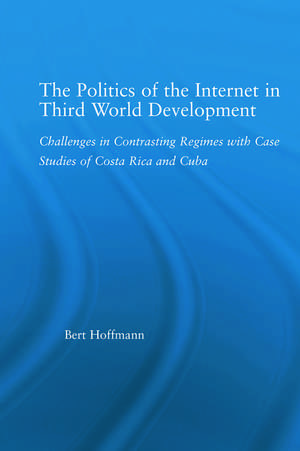The Politics of the Internet in Third World Development: Challenges in Contrasting Regimes with Case Studies of Costa Rica and Cuba: Latin American Studies
Autor Bert Hoffmannen Limba Engleză Paperback – 28 iun 2012
| Toate formatele și edițiile | Preț | Express |
|---|---|---|
| Paperback (1) | 114.06 lei 6-8 săpt. | |
| Taylor & Francis – 28 iun 2012 | 114.06 lei 6-8 săpt. | |
| Hardback (1) | 202.38 lei 6-8 săpt. | |
| Taylor & Francis – 29 sep 2004 | 202.38 lei 6-8 săpt. |
Din seria Latin American Studies
-
 Preț: 173.54 lei
Preț: 173.54 lei -
 Preț: 385.44 lei
Preț: 385.44 lei -
 Preț: 390.12 lei
Preț: 390.12 lei -
 Preț: 328.74 lei
Preț: 328.74 lei -
 Preț: 448.29 lei
Preț: 448.29 lei -
 Preț: 393.93 lei
Preț: 393.93 lei -
 Preț: 440.77 lei
Preț: 440.77 lei -
 Preț: 352.93 lei
Preț: 352.93 lei -
 Preț: 362.05 lei
Preț: 362.05 lei -
 Preț: 449.41 lei
Preț: 449.41 lei -
 Preț: 389.70 lei
Preț: 389.70 lei -
 Preț: 510.78 lei
Preț: 510.78 lei -
 Preț: 435.39 lei
Preț: 435.39 lei -
 Preț: 485.24 lei
Preț: 485.24 lei -
 Preț: 212.82 lei
Preț: 212.82 lei -
 Preț: 481.79 lei
Preț: 481.79 lei - 43%
 Preț: 179.10 lei
Preț: 179.10 lei -
 Preț: 406.81 lei
Preț: 406.81 lei -
 Preț: 426.55 lei
Preț: 426.55 lei -
 Preț: 190.51 lei
Preț: 190.51 lei -
 Preț: 442.50 lei
Preț: 442.50 lei -
 Preț: 412.95 lei
Preț: 412.95 lei -
 Preț: 322.27 lei
Preț: 322.27 lei -
 Preț: 389.27 lei
Preț: 389.27 lei - 18%
 Preț: 1000.45 lei
Preț: 1000.45 lei - 12%
 Preț: 325.34 lei
Preț: 325.34 lei -
 Preț: 436.02 lei
Preț: 436.02 lei - 31%
 Preț: 766.84 lei
Preț: 766.84 lei
Preț: 114.06 lei
Preț vechi: 168.55 lei
-32% Nou
Puncte Express: 171
Preț estimativ în valută:
21.83€ • 22.70$ • 18.02£
21.83€ • 22.70$ • 18.02£
Carte tipărită la comandă
Livrare economică 14-28 aprilie
Preluare comenzi: 021 569.72.76
Specificații
ISBN-13: 9780415650977
ISBN-10: 0415650976
Pagini: 342
Ilustrații: 14
Dimensiuni: 152 x 229 mm
Greutate: 0.63 kg
Ediția:1
Editura: Taylor & Francis
Colecția Routledge
Seria Latin American Studies
Locul publicării:Oxford, United Kingdom
ISBN-10: 0415650976
Pagini: 342
Ilustrații: 14
Dimensiuni: 152 x 229 mm
Greutate: 0.63 kg
Ediția:1
Editura: Taylor & Francis
Colecția Routledge
Seria Latin American Studies
Locul publicării:Oxford, United Kingdom
Cuprins
Introduction Part I: Third World Development and NICT in Political Perspective 1. The New Information and Communication Technologies (NICT): Comparative Experiences and Present Disparities 2. NICT in Third World Development: Political Issues in a Transformed Telecommunications Regime Part II: Latin America's 'Mixed Model': Costa Rica 3. The Costa Rican Development Model and Its Telecommunications Regime 4. Active NICT Development by State Monopoly: A New Costa Rican Model? Part III: Latin America's 'Socialist Model': Cuba 5. Cuba's State-Socialist Development Model and Its Telecommunications Regime 6. From the Rejection of the Internet to the 'Informatization of Society': A Political Anatomy of Change 7. The Politics of the Internet in Third World Development: Conclusions in Comparative Perspective
Descriere
This book examines the political and developmental implications of the new information and communication technologies (NICT) in the Third World. Whereas the concept of the "digital divide" tends to focus on technological and quantitative indicators, this work stresses the crucial role played by the political regime type, the pursued development model and the specific configuration of actors and decision-making dynamics. Two starkly contrasting Third World countries, state-socialist Cuba and the Latin America's "show-case democracy" Costa Rica, were chosen for two in-depth empirical country studies.















